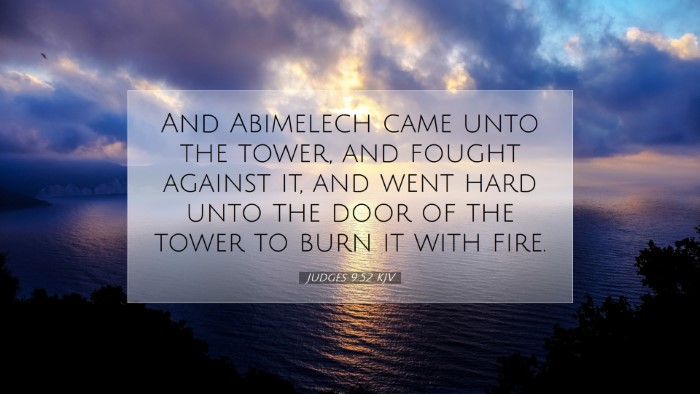Commentary on Judges 9:52
Judges 9:52 states: "And Abimelech came unto the tower, and fought against it, and went hard unto the door of the tower to burn it with fire." This verse describes a crucial moment in the narrative of Abimelech, the son of Gideon, as he attempts to conquer the stronghold of Thebez. The verse embodies themes of ambition, violence, and the judgment of God, as outlined in several public domain commentaries.
Contextual Background
To comprehend the significance of this verse, it is essential to explore the broader context of Judges 9. After Gideon's death, Abimelech, his illegitimate son, seeks power and authority by killing his seventy brothers, aiming to consolidate his rule over Israel. The tower represents a refuge for those fleeing from his violent ascension to power, illustrating the theme of strongholds both physical and spiritual in this text.
Insights from Matthew Henry
Matthew Henry, in his comprehensive commentary on the Bible, emphasizes the moral decay present in Abimelech's actions. He notes that Abimelech’s ambition leads him to commit heinous acts to solidify his power, showcasing how a disregard for righteousness can lead to tyranny.
- Ambition and Tyranny: Abimelech’s siege on the tower emphasizes his tyrannical approach to leadership. Henry highlights how unchecked ambition can lead individuals to disregard moral and ethical boundaries.
- The Significance of the Tower: The tower serves as a metaphor for refuge and security. Henry suggests that while the physical structure offers protection, it also symbolizes humanity’s attempts to find security apart from dependence on God.
Albert Barnes' Commentary
Albert Barnes offers a detailed exploration of the significance of Abimelech’s attack on the tower. He explains that this battle was not just a struggle for physical territory but also a representation of the larger spiritual battle between good and evil.
- Divine Judgment: Barnes reflects on the idea that Abimelech's actions are not only politically motivated but also divinely ordained. His downfall is portrayed as a consequence of his sinful choices, thus illustrating the principle that God ultimately holds leaders accountable for their actions.
- Symbolism of Fire: The intention to "burn it with fire" serves as a potent symbol of destruction. Barnes asserts that fire often represents divine judgment throughout Scripture, symbolizing purification and the consequential wrath of God upon those who rebelled against Him.
Insights from Adam Clarke
Adam Clarke brings a unique perspective, focusing on the social and political implications in Abimelech's actions. He elaborates on how such tyranny can foster distrust and division among the people.
- Consequences of Violence: Clarke observes the impact of Abimelech’s violent campaign, which not only affects the immediate victims but also brings instability to the surrounding community. His tyrannical rule creates an environment of fear and distrust among Israelite tribes.
- Moral Corruption: Clarke warns that leaders like Abimelech, who pursue power through violence, erode moral integrity within a community. His actions challenge believers, calling them to consider the moral implications of their pursuits in leadership.
Theological Implications
The narrative of Judges 9:52 provides theological insights that remain pertinent for contemporary readers. The themes of justice, leadership, integrity, and divine authority resonate strongly in Christian teachings. Pastors and theologians can draw several lessons:
- Leadership Accountability: This passage reiterates the idea that leaders are accountable to God for their decisions. There’s a dire warning against the ambition that leads to unbridled power and tyranny.
- Reliance on God as Refuge: The tower symbolizes not just a physical refuge but a spiritual one. It is imperative for those in positions of leadership and influence to recognize that true security and strength come from reliance on God rather than on human constructs.
- Consequences of Sin: Abimelech's story serves as a cautionary tale about the consequences of living outside of God's will. It illustrates the idea that rebellion against divine authority leads to ruin, not just for the individual, but also for the community.
Conclusion
Judges 9:52 encapsulates the tragic consequences of a leader driven by ambition and a disregard for divine order. The insights gleaned from Matthew Henry, Albert Barnes, and Adam Clarke collectively challenge readers to reflect on the nature of true leadership, the importance of moral integrity, and reliance on God as the ultimate refuge. It is a reminder that the pursuit of power must always be grounded in a commitment to righteousness and justice, and that the path of tyranny leads inevitably to destruction.


